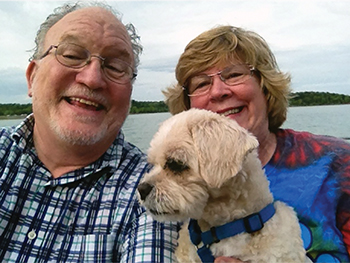Hairy Cell Leukemia Survivor
Take advantage of the support around you

John Kasey’s hairy cell leukemia diagnosis in his early 60s came as a complete surprise. He had no symptoms, but his white blood cell count result from routine, annual bloodwork indicated a problem. After successful initial treatment, John continues to manage his disease with the help of his highly skilled oncologist, a supportive family and wonderful community cancer support resources.
Early on, my oncologist encouraged me by telling me that hairy cell leukemia is typically one of the least problematic types of cancer. In my case, she was right. My initial treatment was as an inpatient for a week so I could receive an ongoing infusion of a medication known as a purine analog. The goal was for it to stop or slow the growth of cancer cells. It was successful, and I didn’t experience any side effects or reactions.
That treatment didn’t cure the leukemia. Instead, this disease has to be managed because there currently isn’t a cure for it. I’m not, however, in active treatment all the time. It’s only necessary when I have symptoms or concerning blood test results, which has happened a few times. When it does, I’m treated with the same purine analog. Fortunately, I haven’t had any physical symptoms, so we rely on the results of my bloodwork at my regularly scheduled follow-up appointments to tell us when we need to treat. I have those every 3 months, and I see my oncologist every 6 months. If the treatment I currently use ever stops being effective, my oncologist suggested that we might consider a targeted therapy.
I’m really comfortable with my oncologist, and I think that’s very important. I didn’t stay with the oncologist who first diagnosed my cancer. I didn’t dislike him, but we didn’t click. I’m more of a happy-go-lucky guy, and he was not. I shared this sentiment with my sister. As the Executive Director of Friend for Life Cancer Support Network, she knew many people in the local cancer community. She recommended an oncologist she thought I’d get along with well, and I set up an appointment.
When we met, I explained why I was seeking a second opinion with her and told her who I’d seen first. She told me she understood my concern but also assured me that he was an excellent doctor and I would have gotten great care from him. I appreciated her professionalism, and now I consider her nothing short of amazing. Along with being knowledgeable and supportive, she’s inclusive and encourages my wife and family to be involved in my care by coming to appointments. And, she’s funny, which makes me like her even more.
My two sisters and I share a healthy sense of humor. Coincidentally, we’ve also all had cancer — breast cancer for one, breast and bladder cancer for another and leukemia for me. I think relying on humor helps us all stay positive.
I have become a big fan of support. My sister told me about a men’s fly fishing cancer support group she’d heard about through a Friend for Life volunteer. I’d never fly fished but it had always intrigued me. Even though I honestly didn’t feel like I needed it, I went on the week-long retreat. On top of realizing how great fly fishing is, it turned out to be one of the most emotional and rewarding experiences of my life.
The men there had different diagnoses at different stages. We all shared our stories, and I felt guilty at times because I wasn’t going through what some of the other men were. I came away with a desire to give back to the community. It’s probably no surprise that I chose Friend for Life. They have an extensive training program that I’m looking forward to. Everyone’s experience is different, and I want to be educated and sensitive to the things that I haven’t experienced when I’m talking with another survivor.
Through everything, I’ve had the love and support of my wife Judy. She’s a retired RN (although I don’t think RNs ever really retire), so she was pretty low key about my diagnosis. She approached it as a problem that we just had to deal with. She was tenacious about research so we could learn more about hairy cell leukemia.
I enjoy life, and I remain hopeful. I’ve always been a very positive person, and I have a lot to be thankful for. I’m a former Marine who was drafted into the Vietnam War but lucky enough to be stationed in Hawaii. Judy and I were extremely fortunate to raise three children who are always concerned (sometimes a little too concerned if that’s possible) about my blood counts. Judy and I spend a lot of time working on house projects and are getting more exercise into our lives. I only have one restriction. I was a consistent platelet donor through the Red Cross. I felt it was something I could do to help others, but I’m no longer allowed to do that with a blood disease.
The best advice I can give to anyone facing cancer is to find support from resources in your community and also from fellow survivors. I did, and it meant the world to me.


